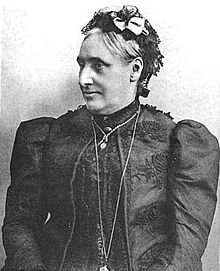Louisa Hubbard
| Louisa Hubbard | |
|---|---|

Louisa Hubbard, c. 1898
|
|
| Born |
8 March 1836 Saint Petersburg, Russia |
| Died | 5 November 1906 (aged 70) Tyrol, Austria |
Louisa Maria Hubbard (8 March 1836 – 5 November 1906) was an English feminist social reformer and writer. She is best known for her activism for increased opportunities for women's education and employment.
Born into a wealthy merchant family in Russia, she moved to England as a young girl and remained there for most of her life. She never married and devoted her time to social activism. She made use of her wealth to fund numerous women's causes. She began her activism in the Anglican deaconess movement in the 1860s. There she organized members and raised awareness of the goals of the movement.
Hubbard then began promoting elementary education as a career for women. Though much of English genteel society was scornful of this profession, Hubbard capitalized on increased awareness of the demand for elementary teachers. She then helped to establish a college to train women as elementary teachers. She was concerned that many women were unable to find work as teachers due to poor educational practices. After establishing the college for teachers, she began promoting other careers for women. Hubbard spent much of her life promoting employment opportunities for women who had to work to support themselves. She particularly focused on unmarried women and impoverished gentlewomen and the disdain in which society held the idea of their employment.
She also published several pamphlets and newspapers that argued in favour of educating and providing employment for women. She published A Handbook for Women's Work, later known as The Englishwoman's Yearbook, from 1875 to 1889. She also published The Woman's Gazette, later known as Work and Leisure, from 1875 until 1893. Hubbard initially contributed most of the articles to the publications and later served as editor. Though they became well known, they were mostly unprofitable and Hubbard was forced to subsidise them with her personal wealth. Hubbard also established the Women's Emigration Society to help single women find work overseas after she learned of the job opportunities that were available in the British Colonies. She also helped organise other groups that promoted emigration.
Hubbard was born in Saint Petersburg to William Egerton Hubbard and Louisa Ellen Hubbard (née Baldock). Her father was a merchant whose family had established business interests in Arkhangelsk Saint Petersburg in the mid 18th century. Her mother was the daughter of a captain. Louisa was the eldest of seven children in the family. In 1843, the Hubbards left Russia for England. They settled on a 2,000-acre (8.1 km2) estate in Leonardslee, where Hubbard was privately educated. She never had to work to support herself due to her family's wealth.
...
Wikipedia
